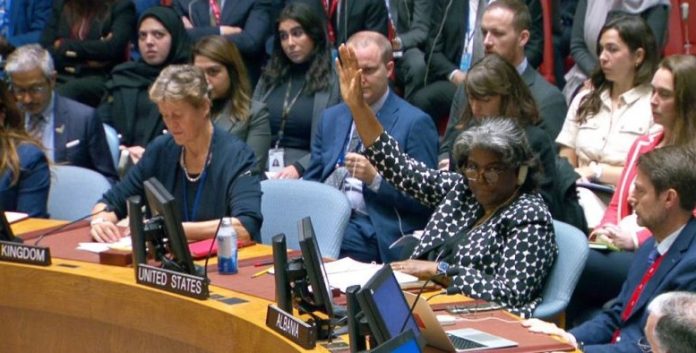A UN Security Council vote on increasing humanitarian aid deliveries to the Gaza Strip was postponed for another day on Tuesday. Discussions continued in an attempt to avoid a third US veto of action on the ongoing war between Israel and Hamas.
Tense negotiations were underway Monday ahead of an expected vote on the United Arab Emirates-sponsored resolution, but it was repeatedly postponed as diplomats continued to negotiate behind closed doors to get Washington to abstain or vote in favour of the resolution, allowing it to pass. UNSC spokesperson John Kirby said on Tuesday afternoon:
“We’re still working through the modalities of the resolution. It’s important for us that the rest of the world understand what’s at stake here and what Hamas did on the 7th of October and how Israel has a right to defend itself against those threats.”
Under the draft resolution, the UN is obliged to monitor humanitarian aid entering Gaza and Israel must allow and facilitate the delivery of aid by land, sea and air to the besieged enclave. It also called for an “urgent and sustained cessation of hostilities,” but that language was softened in a new draft circulated early Tuesday.
Diplomats say the US is pushing for the softened language, which “calls for an urgent cessation of hostilities to ensure safe and unimpeded humanitarian access, as well as urgent steps toward a sustained cessation of hostilities.”
The US and Israel oppose a ceasefire and insist only on brief pauses in fighting to protect civilians and release hostages taken by Hamas. On 8 December, the US vetoed a Security Council resolution demanding an immediate halt to humanitarian aid in Gaza. The 193-member General Assembly overwhelmingly approved a similar resolution on 12 December by a vote of 153-10, with 23 abstentions.
On 15 November, the UN Security Council for the first time adopted a resolution calling for an “urgent and prolonged humanitarian pause” in the fighting, the unimpeded delivery of aid to civilians and the unconditional release of all hostages, with the US abstaining.
The military conflict has spread beyond Gaza, including into the Red Sea, where Iran-backed Houthi forces based in Yemen have attacked merchant ships with missiles and drones, prompting the creation of a multinational naval operation to protect trade routes.
US Defence Secretary Lloyd Austin said in Bahrain that joint naval patrols would be conducted in the southern Red Sea and Gulf of Aden, which cover the main global East-West shipping route. He claimed:
“This is an international challenge that demands collective action.”
A seven-day pause – during which Hamas released some hostages, some Palestinians were freed from Israeli jails and there was an increase in aid to Gaza – had ended on Dec. 1. Gaza’s health ministry says nearly 20,000 Palestinians have been killed since Israel declared war on Hamas following its surprise attacks in southern Israel on 7 October. Hamas militants have killed about 1,200 Israelis – mostly civilians – and taken about 240 hostages in Gaza.
